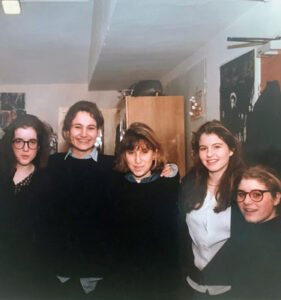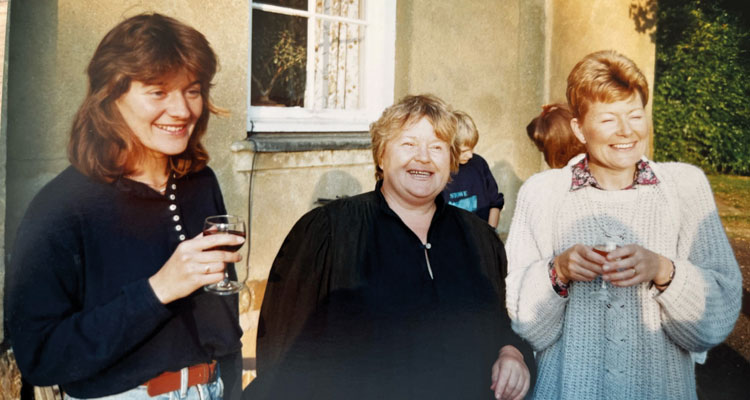It was in 1984, just before the start of the Michaelmas Term when, as a newly appointed teacher, I found myself at a staff discussion day on co-education – would it, could it work at Stowe?
To a man (almost sic), the staff said yes. The arrival of Jeremy Nichols as Headmaster five years later raised hopes that he might bring about change, but he opted for the status quo. Little did we know that we would have to wait more than 20 years before Stowe would become fully co-ed, with Dr Anthony Wallersteiner finally announcing the firm decision in 2004.
By the time I arrived, the School had already been infiltrated – I use the verb advisedly – by a small number of Sixth Form girls in Stanhope, who had been at Stowe since 1974, and was about to receive quite a few more with the opening of Nugent. This presaged much fun and games since the building, to no one’s surprise, wasn’t ready for the start of the school year. Needs must and the top floor of what was then Bruce in the main House was barricaded for the first few weeks by a rota of Nugent staff sleeping there to repel, as it were, boarders.

Once the girls moved into Nugent there followed interesting times… no one had thought to remove the external fire escapes, which proved a constant temptation to numerous boys (and girls) after prep. I subsequently became a Housemistress full of contradiction, simultaneously protecting the girls from “horrid boys” (stories of them rating girls on their appearance abounded – something that is certainly not accepted or tolerated today and looking back it shouldn’t have been allowed to go unpunished then), whilst encouraging them to get out there, socialise and make their mark on the School. It was hard, but it was also fun. A shared Matron, much poorer sports provision and the need to remind everyone constantly that girls existed, were made up for by access for girls to a Stowe education, the development of self-confidence and a lively social scene. The mother of one potential pupil, on hearing the ratio of boys to girls, volunteered herself on the spot to join the staff.
There were uphill struggles, notably in my attempts to bring second wave feminism to the attention of Sixth Form girls, who initially declared themselves to be happy to sit at home and hold dinner parties – not to mention the difficulty in dealing with what would nowadays be called “Me Too” moments (again something that shouldn’t have been allowed to happen at the time). The girls would complain about the behaviour of one or two boys, but solidarity in the face of this seemed to elude them. There were triumphs too though – the girls were easily the academic equals of the boys and often overtook them, House plays would minimise parts for boys (they were tolerated as help backstage) whereas girls would be in great demand for boys’ dramatic efforts and thus be able to spend quite a lot of time legally in boys’ Houses. Best of all was the annual music competition where the girls played to their strengths and frequently won, a success all the more enjoyable in the light of the boys’ protests of unfair advantage. We all felt it was about time that girls enjoyed a bit of that unfairness!
The teaching staff were more open-minded than the pupils and welcomed the growing number of female teachers, though they arrived in a mere trickle during my early years at the School. There was an on-going fight to establish proper female staff changing rooms, which was not resolved until many years later and a brief attempt to change the name of the Masters’ Common Room, which initially amounted to nothing until “Masters” was later quietly dropped – to my personal chagrin! I subsequently became Senior Master and Jeremy Nichols sometimes used to introduce me jokingly as “my Senior Mistress”, which certainly amused the men. At one of my annual reviews, he asked me in time-honoured fashion, how I saw my career progressing and when I said that I would quite like to be Deputy Head one day, he replied that he
didn’t think the Governors would accept a woman in that role. I’m ashamed to say that I didn’t protest, but sadly he was probably right.
The transition to full co-education wasn’t easy, in particular for the boys of Lyttelton who, under the gentle and very diplomatic guidance of Guy Scott (Former staff 1982–1999), were moved into other Houses to make way for girls. But by the time I retired in 2009, the first cohort of girls to arrive in the Third Form were Sixth Form leavers, girls’ Houses were springing up all around and I hope it is nowadays difficult to think of Stowe as anything other than a co-educational school. Looking back, it seems appropriate to pay tribute to all the staff who encouraged, supported and pushed for girls’ education at Stowe, and of course to all those girls who from 1974 put up with a great deal, gave their all and finally established, not without difficulty, their right to benefit in full equality with the boys from all that Stowe has to offer.
Rosemary Masters (Former staff 1986–2009)

